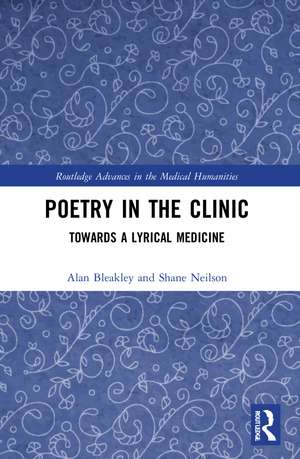Poetry in the Clinic: Towards a Lyrical Medicine: Routledge Advances in the Medical Humanities
Autor Alan Bleakley, Shane Neilsonen Limba Engleză Paperback – 27 mai 2024
Bleakley and Neilson carry out an extensive critical examination of the well-established practices of narrative medicine to show that non-narrative, lyrical poetry does different kind of work, previously unexamined, such as place eclipsing time. They articulate a groundbreaking ‘lyrical medicine’ that promotes aesthetic, ethical and political practices as well as noting the often-concealed metaphor cache of biomedicine. Demonstrating that ambiguity is a key resource in both poetry and medicine, the authors anatomise poetic and medical practices as forms of extended and situated cognition, grounded in close readings of singular contexts. They illustrate structural correspondences between poetic diction and clinical thinking, such as use of sound and metaphor.
This provocative examination of the meaningful overlap between poetic and clinical work is an essential read for researchers and practitioners interested in extending the reach of medical and health humanities, narrative medicine, medical education and English literature.
| Toate formatele și edițiile | Preț | Express |
|---|---|---|
| Paperback (1) | 311.41 lei 3-5 săpt. | +22.67 lei 6-10 zile |
| Taylor & Francis – 27 mai 2024 | 311.41 lei 3-5 săpt. | +22.67 lei 6-10 zile |
| Hardback (1) | 1008.86 lei 6-8 săpt. | |
| Taylor & Francis – 31 dec 2021 | 1008.86 lei 6-8 săpt. |
Din seria Routledge Advances in the Medical Humanities
- 5%
 Preț: 316.76 lei
Preț: 316.76 lei -
 Preț: 325.89 lei
Preț: 325.89 lei -
 Preț: 310.22 lei
Preț: 310.22 lei -
 Preț: 311.41 lei
Preț: 311.41 lei - 5%
 Preț: 834.02 lei
Preț: 834.02 lei - 5%
 Preț: 288.15 lei
Preț: 288.15 lei - 5%
 Preț: 348.73 lei
Preț: 348.73 lei - 5%
 Preț: 379.80 lei
Preț: 379.80 lei - 5%
 Preț: 362.63 lei
Preț: 362.63 lei - 5%
 Preț: 1158.84 lei
Preț: 1158.84 lei - 5%
 Preț: 382.17 lei
Preț: 382.17 lei - 26%
 Preț: 766.05 lei
Preț: 766.05 lei -
 Preț: 371.91 lei
Preț: 371.91 lei - 5%
 Preț: 1161.55 lei
Preț: 1161.55 lei - 5%
 Preț: 353.56 lei
Preț: 353.56 lei - 5%
 Preț: 460.95 lei
Preț: 460.95 lei -
 Preț: 396.14 lei
Preț: 396.14 lei - 5%
 Preț: 357.29 lei
Preț: 357.29 lei - 5%
 Preț: 351.95 lei
Preț: 351.95 lei -
 Preț: 489.00 lei
Preț: 489.00 lei -
 Preț: 376.10 lei
Preț: 376.10 lei - 5%
 Preț: 1094.14 lei
Preț: 1094.14 lei -
 Preț: 303.52 lei
Preț: 303.52 lei - 18%
 Preț: 842.38 lei
Preț: 842.38 lei - 25%
 Preț: 710.66 lei
Preț: 710.66 lei - 26%
 Preț: 764.20 lei
Preț: 764.20 lei - 5%
 Preț: 357.29 lei
Preț: 357.29 lei -
 Preț: 389.38 lei
Preț: 389.38 lei -
 Preț: 376.10 lei
Preț: 376.10 lei - 18%
 Preț: 1000.27 lei
Preț: 1000.27 lei
Preț: 311.41 lei
Nou
Puncte Express: 467
Preț estimativ în valută:
59.60€ • 61.57$ • 49.60£
59.60€ • 61.57$ • 49.60£
Carte disponibilă
Livrare economică 05-19 martie
Livrare express 18-22 februarie pentru 32.66 lei
Preluare comenzi: 021 569.72.76
Specificații
ISBN-13: 9781032195940
ISBN-10: 1032195940
Pagini: 320
Ilustrații: 6
Dimensiuni: 156 x 234 x 23 mm
Greutate: 0.45 kg
Ediția:1
Editura: Taylor & Francis
Colecția Routledge
Seria Routledge Advances in the Medical Humanities
Locul publicării:Oxford, United Kingdom
ISBN-10: 1032195940
Pagini: 320
Ilustrații: 6
Dimensiuni: 156 x 234 x 23 mm
Greutate: 0.45 kg
Ediția:1
Editura: Taylor & Francis
Colecția Routledge
Seria Routledge Advances in the Medical Humanities
Locul publicării:Oxford, United Kingdom
Public țintă
Postgraduate, Professional, and Undergraduate AdvancedCuprins
Part I: Setting Out to Alter the Narrative. 1.In difference (and not deference) to narrative medicine. 2.The imperialism of narrative. 3.What’s the story behind Narrative Medicine? The shared epistemologies of Narrative Medicine and biomedicine. 4.Is narrative medicine just another story biomedicine tells before we go to sleep? 5.What can Russian Formalism do for us lately? & other unapplications. Part II: Theorising Lyrical Medicine 6.Re-visioning diagnostic reasoning, or stepping out from the skull. 7.Out from the skull and into the world. 8.Celebrating lyric poetry, beauty and medical moods. 9.Poeticising with a medical imagination: what medicine can do for poetry. 10.Diagnosing with the poetic imagination: what poetry can do for medicine. 11.Kinds of ambiguity in clinical work. 12.General Change and The Poetry Uselessness Red Book. 13.Tactical ambiguity spelunking amidst Canadian physician-poets. 14.Practitioner-Poets do the Footwork.
Notă biografică
Alan Bleakley is Life Emeritus Professor of Medical Education and Medical Humanities at Plymouth Peninsula School of Medicine, UK. He is a widely published poet, psychologist, and psychotherapist, and has written many academic books, most recently Medical Education, Politics and Social Justice: The Contradiction Cure (Routledge 2021).
Shane Neilson is a poet and medical doctor who practices in Guelph, Ontario, Canada. He has written several books of poetry and poetry criticism. In 2022, he will publishYou May Not Take the Sad and Angry ConsolationsandSaving.
Shane Neilson is a poet and medical doctor who practices in Guelph, Ontario, Canada. He has written several books of poetry and poetry criticism. In 2022, he will publishYou May Not Take the Sad and Angry ConsolationsandSaving.
Descriere
This book explores previously unexamined overlaps between the poetic imagination and the medical mind. It shows how appreciation of poetry can help us to engage with medicine in more intense ways based on ‘defamiliarising’ old habits and bringing poetic forms of ‘close reading’ to the clinic.
